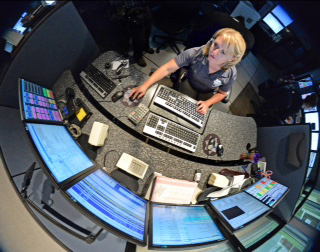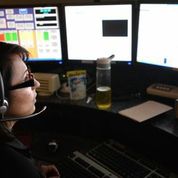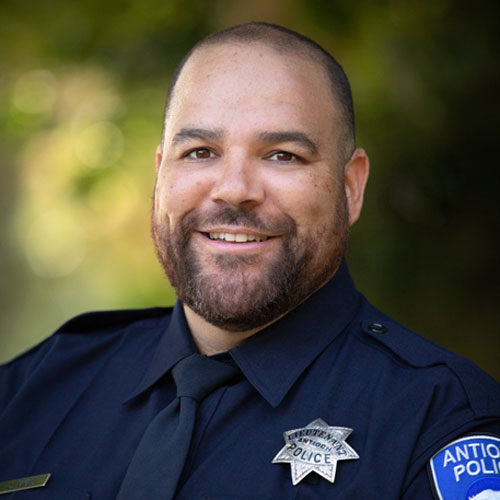Contact Info
Police Department
Tel: (925) 779-6900
Non-Emergency
Tel: (925) 778-2441 *9
Business & Lobby Hours
8 am – 5 pm Mon – Fri
Antioch Police Facility
300 L Street
Antioch, CA 94509
Joe Vigil
Chief of Police
Captain Desmond Bittner
Support Services
Captain Matt Koch
Field Services
Lieutenant Joe Njoroge
Field Services
Lieutenant Michael Mellone
Support Services
Dispatch Supervisor Stacey Malsom
Support Services
Records Supervisor Amanda Nelson
Support Services
Dispatch
 The Antioch Police Department’s Communications Bureau is the primary answering point for non emergency and 9-1-1 emergency calls made in Antioch. Additionally, it provides dispatch services to Antioch Police, Antioch Public Works and Antioch Animal Services.
The Antioch Police Department’s Communications Bureau is the primary answering point for non emergency and 9-1-1 emergency calls made in Antioch. Additionally, it provides dispatch services to Antioch Police, Antioch Public Works and Antioch Animal Services.
The Bureau operates 24 hours a day, 7 days a week. It is staffed by a Bureau Supervisor, 4 Supervising Dispatchers and 11 full time dispatchers. The Antioch Police Communications Bureau processes an average of 6,800 9-1-1 calls and 23,000 business and administrative calls per month. Our dispatch center accepts text to 9-1-1 in cases of emergencies when a phone call can’t be made.
The Communications Bureau serves as a direct link between reporting parties and officers in the field. The dispatchers screen and evaluate approximately 15,000 calls for service each month and provide support for all field operations.
 The Communications Bureau operates with a myriad of technical equipment, including a computer aided dispatch system, GPS automatic vehicle location system, intelligent phone workstations, and East Bay Regional Communications System (EBRCS) radio system. Each component assists the dispatchers in performing their jobs efficiently and professionally.
The Communications Bureau operates with a myriad of technical equipment, including a computer aided dispatch system, GPS automatic vehicle location system, intelligent phone workstations, and East Bay Regional Communications System (EBRCS) radio system. Each component assists the dispatchers in performing their jobs efficiently and professionally.
If you would like additional information about our communications bureau, please contact Stacey Malsom at (925) 779-6965 or email at smalsom@ci.antioch.ca.us
Dispatch Numbers
| Administration | |
| Police Emergency | 9 1 1 |
| Police Urgent | (925) 778-3911 |
| Non Emergency Police Services | (925) 778-2441 |
| Police business | (925) 779-6900 |
| Animal Control | (925) 779-6989 |
Wireless 9-1-1 is a phrase that refers to 9-1-1 calls made from cellular telephones.
Not exactly. When calling 9-1-1 from a home, office, or payphone, the telephone system usually recognizes the address and telephone number of the caller because the phone is “hardwired” to a specific address. Since people using cell phones move from location to location, the telephone system cannot always recognize a caller’s exact location.
It depends on which cell tower picks up the signal. Your call may not always be routed to the nearest 9-1-1 Center. The Antioch Police Department, working in cooperation with several of the Wireless Service Providers, have made improvements to the wireless 9-1-1 services by directing more than half of the cell towers located in the city to the Antioch Police Department instead of the California Highway Patrol (CHP). The remaining cell towers of these Wireless Service Providers have sectors that cover State Route Highway 4, and therefore are required to direct wireless 9-1-1 calls to CHP.
CHP handles millions of wireless 9-1-1 calls each year. This volume can sometimes contribute to delays in responding to emergency calls for help. By directing the majority of Antioch’s cell towers to the Antioch Police Department, emergency calls for help can be handled more quickly by dispatchers familiar with our community and emergency services.
Sometimes. This depends on the type of cell phone you’re using and the duration of the call. On almost all wireless 9-1-1 calls routed to the Antioch Police Department, our intelligent phone workstations will display the originating phone number, Wireless Service Provider name, and the location of the cell tower (not the caller) from which the call is being received. Within 10-15 seconds, in some cases, the dispatcher can request the phone system “Retransmit” the call. Although you, the caller, will not notice any discernable difference, the intelligent phone workstation will now display latitude/longitude coordinates that are entered into a mapping program and used to determine your approximate geographical location.
If the local 9-1-1 Center in the city or town does not have “wireless 9-1-1 direct call delivery,” your wireless 9-1-1 call will be connected to CHP prior to being transferred to the local public safety agency responsible for providing emergency services.
When calling 9-1-1 from your cell phone, be prepared to state:
The LOCATION of the emergency (MOST IMPORTANT),
Your cell phone number (including area code),
The nature of the emergency.
This information is essential to providing emergency help and vital in the event of signal interference or, if for some reason your call is prematurely disconnected.
Become familiar with the features of your cell phone, especially the “key lock” feature which prevents accidental dialing.
Many 9-1-1 calls we receive from cell phones are the result of accidental dialing. Processing these calls can delay help for real emergencies. Accidental dialing often occurs when people sit down on their cell phones placed in their back pockets, causing them to inadvertently dial 9-1-1. This can also occur when cell phones are stored carelessly in other places (e.g. purses, strollers, waistbands).
Using your cell phone while driving can be dangerous. Whenever possible and safe to do so, pull over and park your car in a safe area before using your cell phone.
Don’t place yourself in harm’s way! Calls placed to 9-1-1 have helped to save many lives. This is due, in part, to callers taking the time to report emergencies. Be careful, however, not to place yourself in harm’s way when reporting crimes in progress and other dangerous situations.



